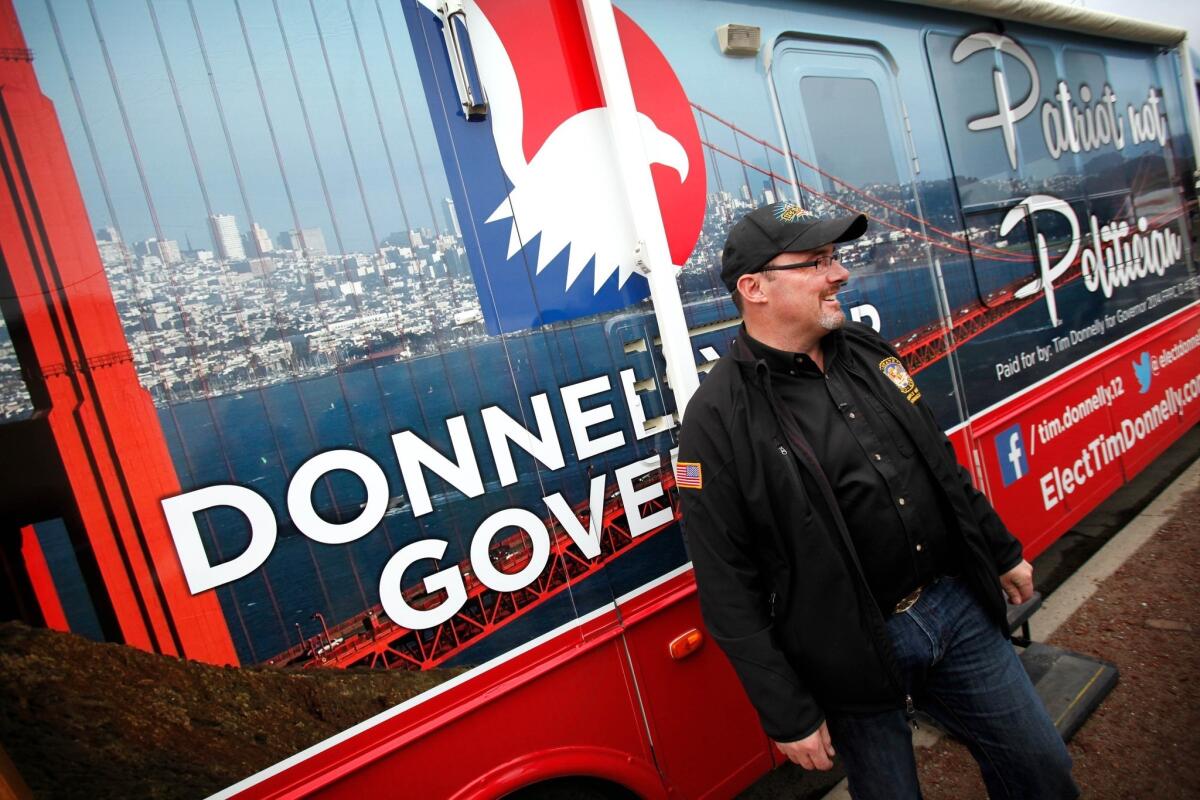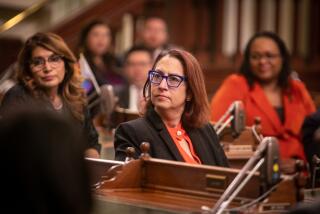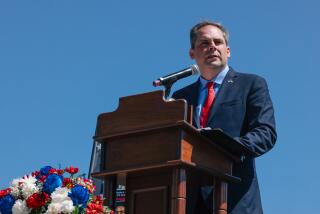Assembly’s tea party firebrand, Tim Donnelly, cools his rhetoric

SACRAMENTO —Tim Donnelly arrived at the Assembly in late 2010 with big plans.
First on his list: a sweeping crackdown on illegal immigration. A plan to dismantle the state’s air quality board was close behind.
In a Capitol dominated by Democrats, those proposals, unsurprisingly, went nowhere. And the cool reception extended to Donnelly himself, one of the Legislature’s few tea party disciples.
The Republican from Twin Peaks, near Lake Arrowhead, had vowed during his campaign that he was “going to Sacramento to start the war,” and he kept up the provocative oratory once he landed.
Donnelly is now running for governor, campaigning on many of the themes he sounded in his initial Assembly run: personal liberty, low taxes and small government. But even as he rails against the political establishment, he says that serving in the Legislature has changed him, particularly in how he deals with political adversaries.
“Instead of looking for ways I can do a frontal assault against this massive wall, I found a way to chip away at a single brick,” Donnelly said. “The key is you have to pick the right brick, and that means people have to agree with it.”
That’s a notable departure from the approach he took when he first ran for office 31/2 years ago. Donnelly, formerly a small-business owner and leader in the Minuteman volunteer border-patrol group, told supporters that he had no interest in making friends in the Legislature.
“I’m going there to reach across the aisles to the enemies of freedom and annihilate them and pound them into the ground and take back our power,” he said at a Tea Party Express rally in Barstow in October 2010.
He promised legislation based on a controversial immigration law passed in Arizona, parts of which have since been overturned by the U.S. Supreme Court. It was the first bill he introduced.
The measure would have ended “sanctuary cities” by ordering state and local officials to comply with federal immigration laws. It would also have imposed strict penalties on businesses that did not verify the immigration status of employees.
A throng of supporters attended the bill’s committee hearing, but the Democrats on the panel promptly killed the measure. Similarly, his bids to require photo identification to vote and to strip funding from the statewide high-speed rail project failed to make it past their first hearings.
An ardent gun-rights advocate, Donnelly offered several firearms bills that have languished. One would have eased the state’s ban on the open carrying of weapons. Another, introduced after the mass shooting at a Newtown, Conn., elementary school, would have created a plan for armed “marshals” on school premises.
In his first two-year term, just one of the 37 measures he introduced passed the Legislature: a resolution recognizing January as National Slavery and Human Trafficking Prevention Month. He has had more victories in his current term: two resolutions (one a reprise of the trafficking measure) and three bills that became law.
One bars state employees from helping the federal government detain terrorism suspects indefinitely in California — a change Democrats could support and a product of Donnelly’s new approach. The proposal was a rebuke to a 2011 federal law requiring certain foreign terrorism suspects to be held by the military rather than move through the civilian justice system.
The bill forged an unexpected partnership between Donnelly and state Sen. Mark Leno, a staunchly liberal Democrat from San Francisco. Leno carried Donnelly’s bill in the Senate. When the two lawmakers’ names appeared side by side on the Senate’s announcement screen, “there was some audible chuckling,” Leno recalled.
Soon, Donnelly returned the favor, shepherding a Leno bill in the Assembly that streamlined the compensation process for those wrongfully convicted of crimes. It later became law.
Leno said Donnelly’s libertarian streak offers chances for collaboration with some Democrats.
“That is where left meets right, at a libertarian point,” Leno said.
Donnelly’s relationship with his fellow Republicans is strained at times. He said the minority party is too willing to compromise, and after his first several weeks in the Capitol, he stopped attending the Assembly GOP’s weekly lunches.
“I eat my lunch by myself,” Donnelly said, adding he thought the confabs were “an impediment to really standing up for what I believe in.”
He did make an appearance at a caucus lunch some weeks ago to ask for his colleagues’ endorsement in his gubernatorial run. His campaign said a half-dozen GOP lawmakers have signed on, including Assemblymen Brian Jones of Santee and Jim Patterson of Fresno.
For most Democrat-aligned groups, Donnelly is a reliable political adversary. The California Labor Federation says that he has voted with them 2% of the time. He opposed one of their top priorities last year: a bill, later signed by Gov. Jerry Brown, to raise the minimum wage to $10 per hour by 2016.
Equality California, a gay-rights group, gives him a zero on its legislative score card. Last year, he voted against a transgender-rights measure, now law, allowing students to participate on sports teams and use bathrooms and other school facilities based on their gender identity rather than biological sex.
Donnelly, a global-warming skeptic, has also been at odds with environmentalists. He unsuccessfully sought to eliminate the Air Resources Board, which regulates air quality throughout California. He has also opposed all efforts to ban or regulate hydraulic fracturing, or “fracking,” the controversial oil and gas extraction method.
He has voted against the budget each year, and his record is almost entirely in line with the positions of small-government groups such as the California Taxpayers Assn. and the Howard Jarvis Taxpayers Assn.
And he has remained a steadfast opponent of liberalizing immigration laws. Donnelly consistently voted against efforts to make driver’s licenses available to people in the country illegally, at least once suggesting that such “gateway identification” could make the country vulnerable to more 9/11-like attacks.
He also launched a campaign to repeal a 2011 law that makes public financial aid available to college students who are in the country illegally. He did not collect enough signatures to put a referendum on the ballot.
His strident floor speeches have distinguished Donnelly from other lawmakers. He declared that the 2011 financial aid measure would contribute “to the death of our republic.”
A year later, he said of the state’s welfare program, “That’s not the American dream. That’s slavery. That is putting people under the yoke of the government, making them dependent on the government and expecting other people to pay their way.”
But the assemblyman says that lately he has tried to dial back the rhetoric.
“That’s one of the ways in which this place has changed me — learning to be respectful with people with whom I disagree vehemently on almost everything,” Donnelly said. “I wasn’t as good at that at the beginning.”
The shift, he said, was spurred by a conversation with Assemblywoman Bonnie Lowenthal (D-Long Beach).
“When you come across as you-vs.-us, that just takes all of that power out of what you’re saying,” Donnelly recalled Lowenthal telling him.
Lowenthal said she “gave the same advice I would give any one of my colleagues — we can disagree about the issues, but we owe it to our constituents and the institution to keep it civil and respectful.”
She said she believes that he took her words to heart.
“There’s not the same heightened accusations as before,” she said. “He’s less bombastic on the floor.”
Assemblyman Rocky J. Chavez (R-Oceanside) said he hadn’t noticed a mellower tone, but noted that Donnelly “doesn’t talk as much as he did the first six months I was here.
“He isn’t commenting on everything.”
More to Read
Sign up for Essential California
The most important California stories and recommendations in your inbox every morning.
You may occasionally receive promotional content from the Los Angeles Times.











